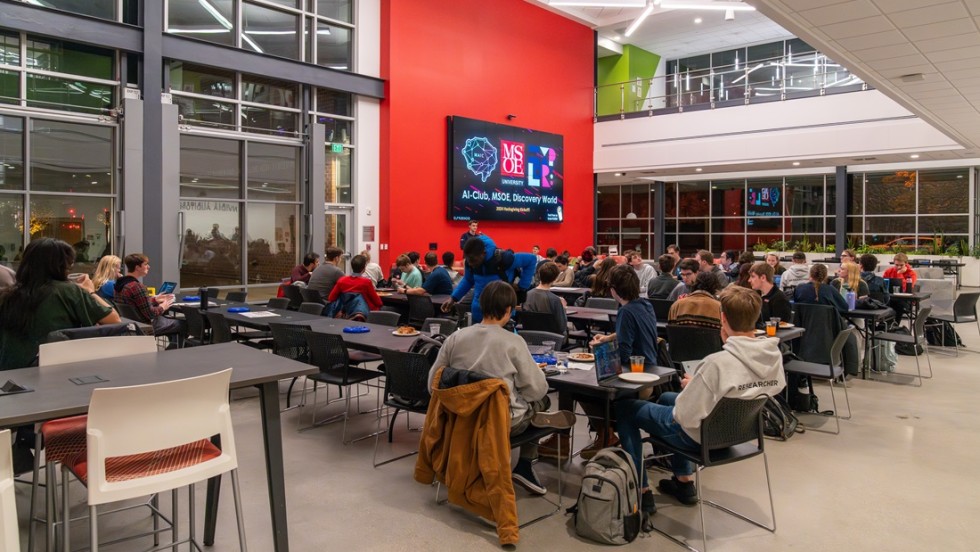MSOE held its second annual Hacksgiving: AI for Good Hackathon from November 21 to 24 in Diercks Hall. Hacksgiving is a hackathon that provides students with the opportunity to leverage their skill sets to contribute to their communities by developing AI-driven solutions that support local nonprofits.
This year’s nonprofit partner was Discovery World, a science and technology museum and aquarium located in Milwaukee. This problem statement asked students to develop a solution to enhance visitor interaction with Discovery World’s exhibits.
Students were presented with a problem statement during a kick-off celebration on Thursday, November 21st, and then worked in teams or individually during working hours on Friday and Saturday. They put the finishing touches on the project on Sunday morning and presented their solutions to the judges on Sunday afternoon.
This year’s Hacksgiving had double the participation compared to the first Hackathon in 2023, with more than 70 students across 10 teams. New this year, Cristo Rey Jesuit High School students were invited to the final day of the event to get an inside look at the college-level hackathon and watch the final presentations.
Hacksgiving was developed and supported by Dr. Jeremy Kedziora, PieperPower Endowed Chair in Artificial Intelligence. Ben Paulson, a computer science major and president of the AI Club, helped develop and organize the event.
“I saw some very passionate builders who really wanted to make a difference to Discovery World and everyone who visits it,” Paulson said.
The hackathon was judged by adjunct assistant professor Robert Bardunias. Evan Jackson ’23, Experience Designer at Discovery World. Keziora and Paulson.
The winning solution was handed over to Discovery World and used to improve the visitor experience. “I’m looking forward to seeing how Discovery World leverages the solutions our team has built,” said Paulson.
The winning team includes:
1st place $3,000: Discovery Mate Description: Discovery Mate is a custom feature that minimizes hallucinations, enables real-time page translation and text-to-speech, voice interruptible chatbot conversations with real-time language switching, and an exhibit recommendation engine. Developed an AI framework. And so on. Team Members: Alhagie Boye, Olek Drobek, Caleb Gray, Bart Gebka, Sonia Grade, Autumn Mizer, Alex Neher 2nd place $2,000: Yarvis Description: Team Yarvis uses Bluetooth to detect where your application’s users are and tell them what to do. I suggested using a repeater. Point the app at the exhibit room they’re in, tell them about the exhibits, and ultimately bring the entire facility to life just by walking around. Team Members: Mazen Hamid, Travis Jankowski, Alex Lopez, Noah Nieberle, Patrick Rafferty, Gabby Sladek 3rd Place $1,000: Liquid Vision Description: Liquid Vision helps build scalable technology solutions, including gamified learning badges, scaling, and more. focused on user interactions. QR codes for exhibits, questions about exhibits, etc. Team Members: Sidney Balboni, Mason Beynon, Regan Berkemper, Zoe Kirkman, Kathryn Leanos, Adam Swedlund, Michael Wood Honorable Mention Geo: Giovanni Martinez Cortez Salvador Explore Discovery: Andy Dao, Lee Goetsch , Benjamin Leshin, Aiden Miller, Andrew Needham, Evan Roegner, Miles Trompeter



